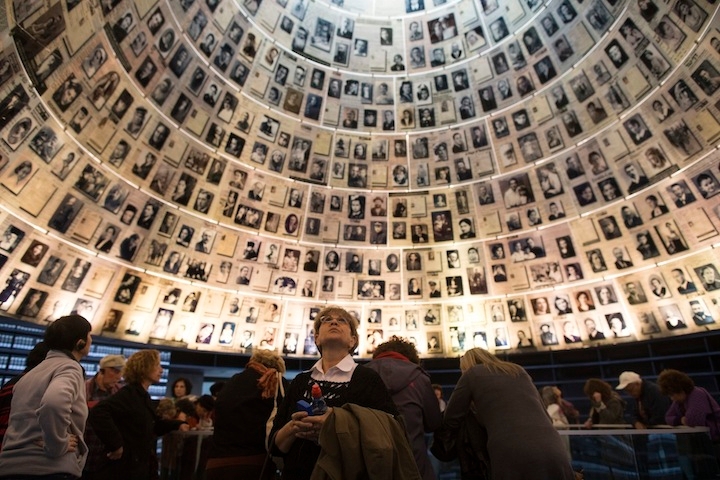Op-Ed: Holocaust consciousness must not blind us to Palestinian suffering
Published January 20, 2015

Visitors gather in the Hall of Names at Yad Vashem in Jerusalem on Jan. 27, 2014, International Holocaust Remembrance Day. (Uriel Sinai/Getty Images)
NEW BRUNSWICK, N.J. (JTA) — While nascent talk of the Holocaust was in the air when I was growing up in New York City, we did not learn about it in school, even in lessons about World War II or the waves of immigration to America’s shores. There were no public memorials or museums to the murdered millions, and the genocide of European Jewry was subsumed under talk of “the war.”
My father was a somber man who arrived here from Poland after the war and, like many survivors, kept to himself, trying his best to block out the past. Growing up, my connection to my father’s lost world consisted of names mentioned in hushed tones and photographs retrieved from hidden boxes.
But as I grew older, I watched with great interest, more than a little curiosity, and a good deal of relief as it became more acceptable to talk about “our” tragedy. By the 1980s, lessons about the genocide of European Jewry became de rigueur in high schools through the nation. In the following decade, people could flock to a hulking museum in our nation’s capital that told the story for all who cared to listen.
The Holocaust became a universal moral touchstone that called upon us to defend our common humanity against the capacity for evil. But today, on the eve of International Holocaust Remembrance Day on Jan. 27, the lesson we Jews seem to draw from our history is that those outside the tribe cannot be trusted.
In the wake of the recent terrorist attack on a kosher food store in Paris, and as anti-Semitism rises in France and elsewhere, these fears seem understandable. I know these kinds of fears well. Even in the relative comfort of his postwar existence, my father had a recurring nightmare that he was being chased by German shepherds.
But when such fears lead to catastrophic thinking, they harden our hearts to the suffering of others and contribute, paradoxically, to a sense of Holocaust fatigue among many Jewish Americans — particularly younger ones.
“I’m sick of the Holocaust as a shorthand for ‘we suffered more than you, so we should get the piece of cake with the rosette on it,’ ” a 20-something columnist wrote in the Forward. Peter Beinart in “The Crisis of Zionism” argues that the growing emphasis on the Holocaust in American life beginning in the 1960s and ’70s marked the end of Jewish universalism.
“Liberalism was out,” Beinart wrote. “Tribalism was in.”
Beinart and others are partly right: Holocaust trauma is too readily exploited. But historically, Holocaust commemoration efforts have been more than simply exercises in tribalism. They often emerged from an urge to acknowledge and alleviate human suffering writ large.
Raphael Lemkin, the Polish-Jewish legal scholar and Holocaust survivor who coined the term “genocide” and fought to have the concept recognized by the United Nations, exemplified this impulse. So did the mobilization of the Holocaust second generation. As I argue in my book “Reluctant Witnesses,” we descendants of survivors, empowered by the progressive movements of the 1960s and ’70s, coaxed our parents to share their stories. The Holocaust consciousness we helped build was part of a larger search for self-expression and human rights.
Today, many Holocaust commemoration activities reflect this universal spirit as well, including the U.S. Holocaust Memorial Museum’s efforts to promote awareness of genocide in Sudan and elsewhere. Jewish-American donors provided the bulk of the funds for a memorial to the more than 2 million Cambodians murdered during the brutal reign of the Khmer Rouge, an acknowledgement of a shared tragic history.
These and other efforts to remember the suffering of others should be applauded, but they must be more than window dressing. They should also spur our own collective soul-searching. Committing funds for projects in places where Jews have few political or emotional investments, such as Cambodia or Sudan, is relatively easy. Subjecting our own deeply felt loyalties to Israel to scrutiny is a much more difficult, but no less important, task.
The truth is that at times our privileges may in fact be implicated in the suffering of others in the Palestinian territories, where life is brutal and frequently too short. A sense of hopelessness prevails among both Israelis and Palestinians, fueling acts of desperation and violence in the Middle East and beyond.
A chorus of leaders on both sides is promoting a politics of fear, declaring I cannot be my brother’s keeper when my brother is out to murder me. But on this Holocaust Remembrance Day, let us honor the memory of the parents and grandparents, uncles and aunts, and all of the unknown others we have lost by resisting such talk and redoubling our efforts to seek peace.
Arlene Stein, a professor of sociology at Rutgers University, is the author of the new book “Reluctant Witnesses: Survivors, Their Children, and the Rise of Holocaust Consciousness” (Oxford).
![]()














